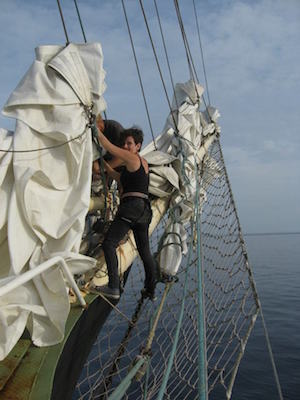An Israeli activist on how she was detained and summoned for a ‘chat’ with Israel’s internal security service which, among other things, wanted to know her thoughts on Zionism — all because she participated in a Gaza flotilla three years ago.
By Reut Mor

Heading home to Israel this past Sunday from vacation on the beautiful Green island of Aegina, my partner and I thought we would go home, relax and upload a few photos to Facebook. I did not expect our the end of our vacation to turn into three days of detentions, interrogations and run-ins with Israel’s security services, all because three years ago I boarded a boat to Gaza — one that never arrived.
Let’s be clear, I’ve been detained before. In fact, short detentions have turned into a ritual of sorts ever since I participated in an attempt — on the Estelle — to break the siege on Gaza in 2012. But this time was different. It lasted longer than usual and after more than an hour, I was called into a side room where I was handed a summons to a appear at a Tel Aviv police station. The only information written on the summons came in the form of one word, a name: “Rona.” I wasn’t told why I was being summoned, or by whom, just “Rona.”
“Rona from the Shabaq” has become kind of notorious among left-wing activists in Israel. More than a few activists have been summoned to her for “conversations” on an eclectic range of topics. (Shabaq is the Hebrew acronym for the Shin Bet, Israel’s internal security service.) With a smile, Rona told me as much when we met on Tuesday at a Tel Aviv police station, where she has hosted, in her own words, “radical left- and right-wing activists.”
I was summoned to appear a day after my return to Israel, but after a Kafka-esque missed connection of sorts with my very own Shin Bet interlocutor, we only finally sat down together the next day. I arrived with my attorney, Anu Lusky, of the Michael Sfard Law Office.

Rona had a lot of questions: What was I doing in Greece? Had I been in contact with activists on the current flotilla to Gaza? What are my thoughts on Zionism? What did I do in the army? What year was Combatants for Peace was founded? She also asked whether I still work for the Joint List, and who my clients are in my media consultancy business.
Most of the answers to Rona’s questions can be easily found with a simple Google search. Regarding her other questions dealing with my political views and my thoughts on Zionism, I told her that as somebody whose work is to raise awareness of those very issues among the Israeli public, I would be happy to answer them. However, I was not willing to do so in a situation I was forced into — but that I would be happy to do so over a cup of coffee. She said she would love to — soon.
But I wasn’t satisfied with Rona’s questions. I felt I had to explain a few things to her, too. I explained to her that the Gaza flotilla project is a non-violent international movement whose goals are to raise awareness about the situation in Gaza and to challenge the terrible, eight-year-old blockade. The flotilla ships stop in ports across Europe and hold a variety of public events in each port of call. Nothing about them is secret or hidden; the whole point is to create a public discussion. Just like in many other situations, I told Rona, Israel’s response to the campaign is extremely disproportionate — sending dozens, if not hundreds, of naval commandos to intercept the ships.
I also decided to tell Rona, and the other unnamed young woman sitting next her, a little about my experience on the Estelle. I told them how dozens of masked Israeli naval commandos took over the sailboat carrying 30 activists, two of whom were elderly, none of whom were armed and all of whom were well-mannered. I told them how I saw the commandos beating and tasing other activists onboard, including one who is now serving as a minister in the Greek government. I told them how I was given a special “punishment,” one apparently reserved just for women.
I was still on the upper deck when the commandos finished taking control of the ship. One by one, they took the activists and put them in the hull of the ship. Ultimately, I was left alone on the upper deck, surrounded by a group of masked men. Out of nowhere, three female Border Police officers showed up. I heard one of the commandos’ officers tell one the female border policewomen to “give it to me.”
They started performing a full body search — the type that is usually done in private rooms — in front of all of the male commandos. They pulled down my tank top and bra, aggressively unbuttoned my pants, and told me to drop them to my knees. I don’t know how long I stood there like that. It felt like forever until they told me to “get dressed” and brought me to the rest of my friends on the Estelle, who apparently saw the terror on my face because they spontaneously stood and applauded my arrival.
Back in Tel Aviv, Rona made a shocked face. She told me such behavior is truly unnecessary, and then went back to asking completely unnecessary questions.
Let’s be clear about one thing: there is absolutely no connection between this type of Shin Bet harassment and Israel’s state security. It is political persecution and it is preposterous. If being stripped naked in front of dozens of soldiers didn’t make me stop my activism, then a meeting with Rona in the heart of Tel Aviv probably isn’t going to get the job done either.
I am back at home now, wishing the best of luck to all of my friends who are sailing to Gaza right now, people who know that they, too, will soon meet the world’s most moral naval commandos. Stay safe.
Most importantly, I hope that this flotilla, like those that preceded it, manages to create yet another crack in the inhumane blockade on the Gaza Strip. I hope that we all soon understand that security will prevail here only when everybody in the region has hope of living in dignity and fulfilling their dreams. I’m waiting for the day that the doors to the world’s largest prison swing open.
Reut Mor is an independent media consultant. A version of this article also appeared in Hebrew on Local Call. Read it here.

